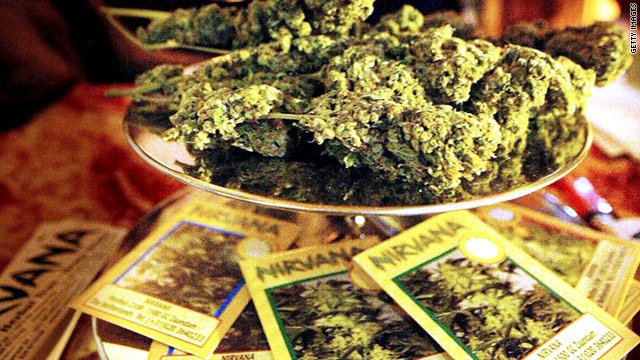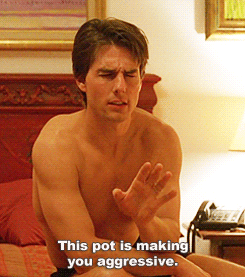Eyes wide shut - the truth behind the marijuana policy in the Netherlands
While I see more and more topics about marijuana on Steemit I started to realize that the American policy in several states might actually be a lot better and more sophisticated than it is in my home country, the Netherlands. While the majority of people associate our country and our capital city Amsterdam with the legal use of weed, it actually isn’t. Let me explain.

So is weed legal in the Netherlands?
According to the so-called dutch ‘opium law’, one cannot possess, grow, distribute and/or export soft drugs (the #dutch make a distinction between softer types of drugs like marijuana or alcohol and hard drugs like cocaine or heroine) in the kingdom of the Netherlands and thus it is prohibited and illegal. As you can see, the actual usage or consumage of soft drugs is not mentioned. What this means, is that consuming soft drugs is not prohibited by law in the Netherlands while owning it in fact is. But in order for a person to be able to consume marijuana, one has to actually own it. Because of this, the dutch government could at any time prosecute a person for the consumption of marijuana.
Eyes wide shut aka the ‘appeasement policy’
In the Netherlands, we are the proud owner of a ‘gedoogbeleid’. A term that doesn’t really let itself translate into English. Online I found a translation that called it the ‘appeasement policy’, but in short what it really is in fact, is a government playing eyes wide shut. The ‘gedoogbeleid’ entails the premise that you can consume marijuana, but that it is not promoted or stimulated and that it is the government's objective to lower the percentage of the population that consume it overall. Officially, the consuming of more than 5 grams is punishable, but the dutch police won’t act if the selling and consuming occur in so-called ‘coffeeshops’. Consuming marijuana is therefore not considered illegal if it is done so in a controlled environment, which also includes private property like your own home. If you want to buy marijuana in a dutch coffeeshop, you have to have the minimum age of 18 years. Selling or exporting marijuana to persons younger than 18 is considered a serious crime and offenders can expect high punishments from the dutch court. As long as you don’t own more than five grams of cannabis or five (grams of) hemp plants you will not be prosecuted. However, these small amounts of soft drugs you own or carry can get confiscated by law officials in certain situations. The dutch coffeeshops are also only allowed to sell a person this maximum of five grams.

Coffeeshop rules and regulations
The dutch coffeeshops have to oblige to several rules and regulations. When a coffeeshop follows these guidelines, no prosecution will occur. In short, the rules are:
• A coffeeshop cannot be involved in any advertising or branding except for a sign on the front of its building.
• It is absolutely not allowed to sell or distribute hard drugs within a coffeeshop establishment.
• A coffeeshop is not allowed to be a source of inconvenience. This includes noise complaints, pollution of the environment or costumers that stroll around the building.
• You are not allowed to sell the product to people younger than 18.
• You cannot sell a person more than five grams per day.
• The selling of marihuana has to occur within the building.
• Coffeeshops are not allowed to be located anywhere near schools.
Also, dutch coffeeshops are not allowed to have large quantities of stock. The maximum amount of marijuana a coffeeshop is allowed to have is 500 grams. In a lot of dutch cities, these stocks are heavily monitored. A coffeeshop risks being shut down if it fails to meet any of these preconditions. An important benefit of the dutch coffeeshop-policy we have to mention is that because of its rules and regulations there are no preconditions created for the selling of hard drugs. The selling of these ‘dangerous’ type drugs occurs elsewhere, which prevents young people from getting into contact with these substances while visiting a coffeeshop.

Getting high on the right supply
But how do the dutch coffeeshops get their stock of marijuana when growing it is considered illegal you ask? Well, as explained above, it is allowed for every dutch citizen to grow five hemp plants in his or her own home. But this produces not nearly enough cannabis to supply the coffeeshops, and it also presents the bottleneck of this whole tale. Home growers cannot deliver enough marijuana because the demand is too high, which leaves room for illegally organized groups to step in and handle things on a much greater scale. These groups tend to grow much larger quantities in much greater facilities. In order to stay largely unnoticed, they hire people to illegally tap electricity from the network or manipulate the meters so it is not measurable what amount of electricity is used. Professional ventilation systems are installed so the smell of the hemp plants is undetectable outside of the illegal growing facility. The only cause of problems, however, is the heat that is produced by the light bulbs and lamps used to grow the hemp plants. During the winter this means that there is no snow visible on the roofs of these buildings and facilities, which makes it really suspicious.

Once the hemp plants are fully grown, the buds are extracted from the plant and the product has to get transported to the coffeeshops in order to get sold to the consumer. This process has to occur fast and discrete. Because as you might remember, it is illegal to carry more than five grams of marijuana in public. Transporting the product from the supplier towards the coffeeshops is repeated many times a day because the demand from the coffeeshops is significant due to the fact that they are only allowed to store a total amount of 500 grams at a time. The people who transport the cannabis are known as ‘runners’, along with the suppliers they are the group of people who take the highest risks. Once the product reaches the coffeeshops, it finally gets sold to the consumer but is done so without taxes being charged. Because taxing soft drugs does not comply with regulations imposed by the European Union...
So whats up?
Why does the dutch marijuana policy work the way it does? Well, this has a variety of reasons. First, the government is absolutely clueless. They are very much afraid of any damage being done to the image of the country in foreign politics. Also, within their own policy making, they have been unable to figure out exactly what to do for years on end. The bottom line is that I strongly feel that the marijuana policy in the Netherlands would be less hypocrite if we could just get it to become a legal product. Exterminating drugs, and soft drugs in particular from our society is a utopian and naive thought and only results in criminals being active in the production, selling and distribution of these substances. If marijuana gets completely legalized, it would mean that the government can also charge taxes on the product and the amounts of THC (the active substance in marijuana) can get regulated. Also, the entire growing process can be handled by the government instead of the marijuana being grown in illegal facilities run by illegal groups.

I’m very curious to find out how you fellow Steemers feel about this situation, and also what the current situation around marijuana is like in your country or state. Hopefully, we can get a good discussion started.
I support medical use. Simply wanting to get high is stupid thing.
Half of USA states have legalized medical use of cannabis and couple states have legalized recreational use but those are not limitless. There are limits for individuals about growing. There are regulations for dispensaries.
Australia has one state with legalized cannabis and another one will have it from the start of 2017. The cannabis movement is slowly but unstoppably spreading around the world.
Yes, simply wanting to get high is a stupid thing.
Pardon me, I am off to go guzzle a beer.
I live in Washington State where marijuana is legal it is nice. What about Psilocybin in Netherlands how does that work with the law. Now there is more academic research being done on the benefits of Psilocybin for many conditions. I know that the shops also sell truffles there so it would be interesting how the law works for that.
Mushrooms/psilocybin are sinds 2008 illegal in The Netherlands
Why not go further and bring down the required hours for a work week. Isn't that supposed the be the benefit of posterity? Everyone gets to take it easy for a bit? Instead, nothing changes for us but the rich get richer and get to enjoy life. What do we get for the fruits of our labors? Oooh a two week vacation!!!! Preposterous!
Simply Great Information and Presentation